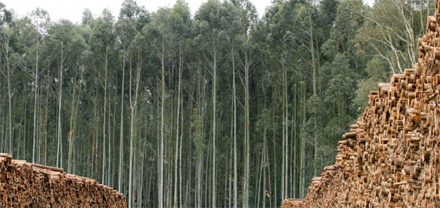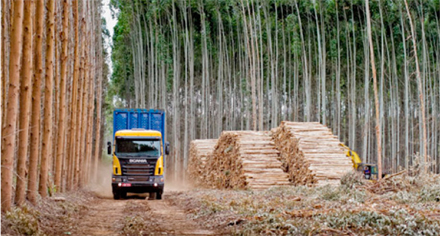
Uruguay’s 30-year plan to build a forestry industry from scratch is paying off, with forest products now the South American’s country’s biggest export this year. By Philip Hopkins for Timberbiz
The Agriculture, Fisheries and Ranching Minister, Tabare Aguerre, said investment in forestry-related industries had been the largest in the country’s history, creating a major source of direct and indirect jobs.
“We are celebrating the 30th anniversary of the forestry law… which responded to initiatives from many years earlier, and providing the industry with incentives to make ours a forestry country,” Mr Aguerre said.
The 1987 new forestry law, promulgated in 1990, vowed to create 200,000 hectares of plantation forest within five years.
Uruguay’s forestry industry now includes one million hectares of plantations, accounting for 3.6% of gross domestic product, 25,000 jobs in 1750 companies, average export revenues of $US1.5 billion and $280 million in taxes.
 The South American country is 176,215 kilometres in area – about 70% the size of the state of Victoria – with 3.5 million people.
The South American country is 176,215 kilometres in area – about 70% the size of the state of Victoria – with 3.5 million people.
A report from the Uruguay investment and export promotion agency, identifying the country’s forestry advantages, noted it was on the same latitude as other big forestry countries in the southern hemisphere.
These included the south of Australia, New Zealand and South Africa and the central regions of Chile and Argentina.
The report said in the past 25 years, the planted surface area had multiplied by 30, reaching one million hectares. The forest priority area covers four million hectares, 24% of the country’s total agricultural area.
The Government’s forest policy has been underpinned by a general investment promotion scheme. Foreign investors are given the same incentives as local investors, and there is no tax discrimination or restrictions for transferring profits abroad.
Investments promoted by the Government’s executive branch have tax exemptions – between 20% and 100% of the invested amount, depending on the type of project and the score attained based on a number of indicators.
Corporate tax is a flat 25%. Personal property included in fixed assets and civil works are exempt from the Net Wealth Tax, and the Value Added Tax is recovered from materials bought for civil works.
Uruguay has also put in place 12 free trade zones, which are exempt from national tax. In forestry, two free trade zones were specifically created to benefit two pulp mills operating in the country: Finland’s UPM and Montes del Plata (Chilean, Swedish-Finnish). A free trade zone would also beset up for a proposed third pulp mill.
Plantations and forestry are regulated; the law declares it is in the national interest to protect, improve, expand and create forest resources, and to develop forest-based industries and in general, the forest economy.
It specifies that income from this activity will not be taxed; the value or size of forestry priority areas will not be assessed for the Wealth Tax; and there is no rural real estate tax (tax on land ownership).
To be eligible for these tax benefits, the Forestry Bureau – the specially created main reference body on forestry management – must approve companies’ development plans for the forests.
Specifically, short-cycle plantations (less than 15 years) with no pruning or thinning do not receive tax exemptions.
An important part of forest policy was the establishment of the Wood Forest Sector Council in the second half of 2010.
The council, which consists of employers, workers and technicians in the public and private sectors, was launched as a tool for coordinating and generating input to forestry policy.
Timber Investment Management Organisations (TIMOs) such as GFP, GMO, BTC and Stafford now operate in Uruguay.
Forest product exports (wood, cellulose and paper) now make up 17% of exports. Within this sector, cellulose accounted for 81% of the exports, with wood and paper respectively 15% and 4%.





